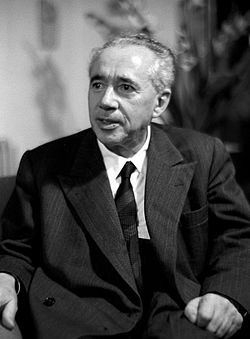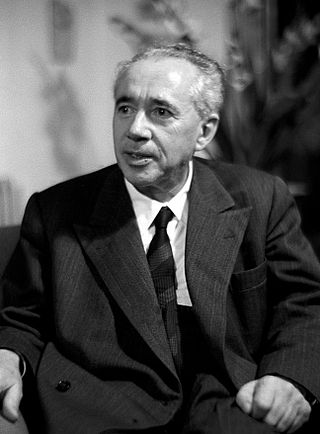Giulio Natta
Italian chemist (1903–1979) From Wikipedia, the free encyclopedia
Giulio Natta (Italian: [ˈd͡ʒu.ljo ˈnat.ta]; 26 February 1903 – 2 May 1979) was an Italian chemical engineer and Nobel laureate. He won a Nobel Prize in Chemistry in 1963 with Karl Ziegler for work on high density polymers. He also received a Lomonosov Gold Medal in 1969.[1]
Giulio Natta | |
|---|---|
 Giulio Natta | |
| Born | 26 February 1903 Imperia, Italy |
| Died | 2 May 1979 (aged 76) Bergamo, Italy |
| Alma mater | Politecnico di Milano |
| Known for | Natta projection Ziegler–Natta catalyst Polypropylene |
| Awards | Nobel Prize in Chemistry (1963) Lomonosov Gold Medal (1969) |
| Scientific career | |
| Fields | Organic chemistry |
| Institutions | Pavia University University of Rome La Sapienza Politecnico di Torino |
Biography
Summarize
Perspective
Early years
Natta was born in Imperia, Italy. He earned his degree in chemical engineering from the Politecnico di Milano university in Milan in 1924. In 1927 he passed the exams for becoming a professor there. From 1929 to 1933, he was also in charge of physical chemistry at the Faculty of Sciences of the University of Milan. In 1933 he became a full professor and the director of the Institute of General Chemistry of Pavia University, where he stayed until 1935. During this time he began using crystallography to elucidate the structures of a wide variety of molecules including phosphine, arsine and others. In that year he was appointed full professor in physical chemistry at the University of Rome.[1]
Career
From 1936 to 1938 he moved as a full professor and director of the Institute of Industrial Chemistry at the Polytechnic Institute of Turin. In 1938 he took over as the head of the Department of chemical engineering at the Politecnico di Milano university, in a somewhat controversial manner, when his predecessor Mario Giacomo Levi was forced to step down because of racial laws against Jews being introduced in Fascist Italy.[1]
Natta's work at Politecnico di Milano led to the improvement of earlier work by Karl Ziegler and to the development of the Ziegler–Natta catalyst. He received the Nobel Prize in Chemistry in 1963 with Karl Ziegler for their research in high polymers.
Personal life

In 1935 Natta married Rosita Beati; a graduate in literature, she coined the terms "isotactic", "atactic" and "syndiotactic" for polymers discovered by her husband.[2] They had two children, Giuseppe and Franca. Rosita died in 1968.[1]
Natta was diagnosed with Parkinson's disease in 1956. By 1963, his condition had progressed to the point that he required the assistance of his son and four colleagues to present his speech at the Nobel ceremonies in Stockholm. Natta died in Bergamo, Italy at age 76.[1]
See also
References
Further reading
External links
Wikiwand - on
Seamless Wikipedia browsing. On steroids.
